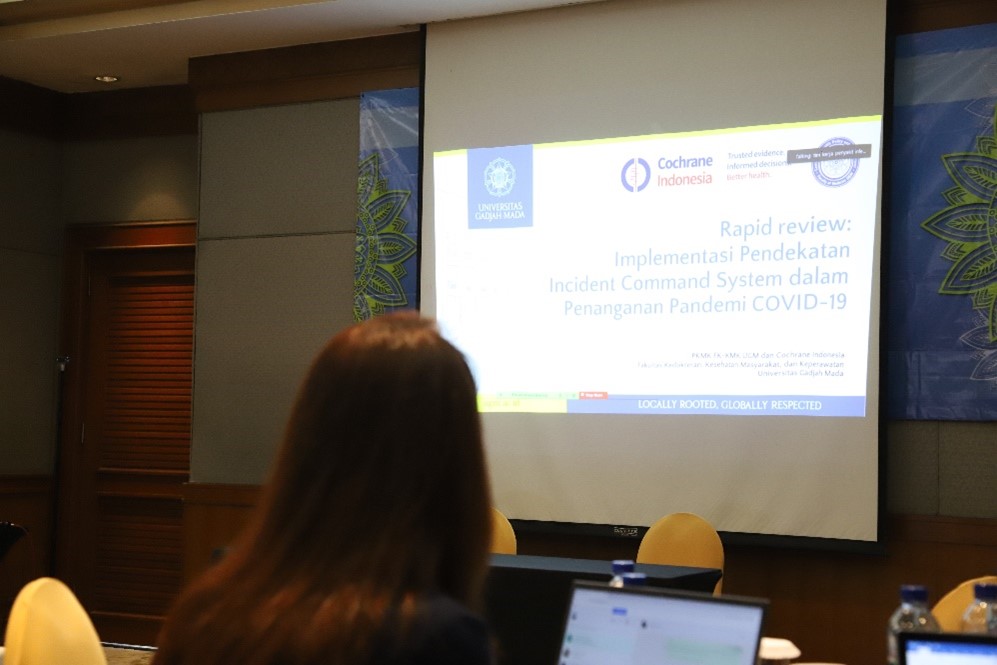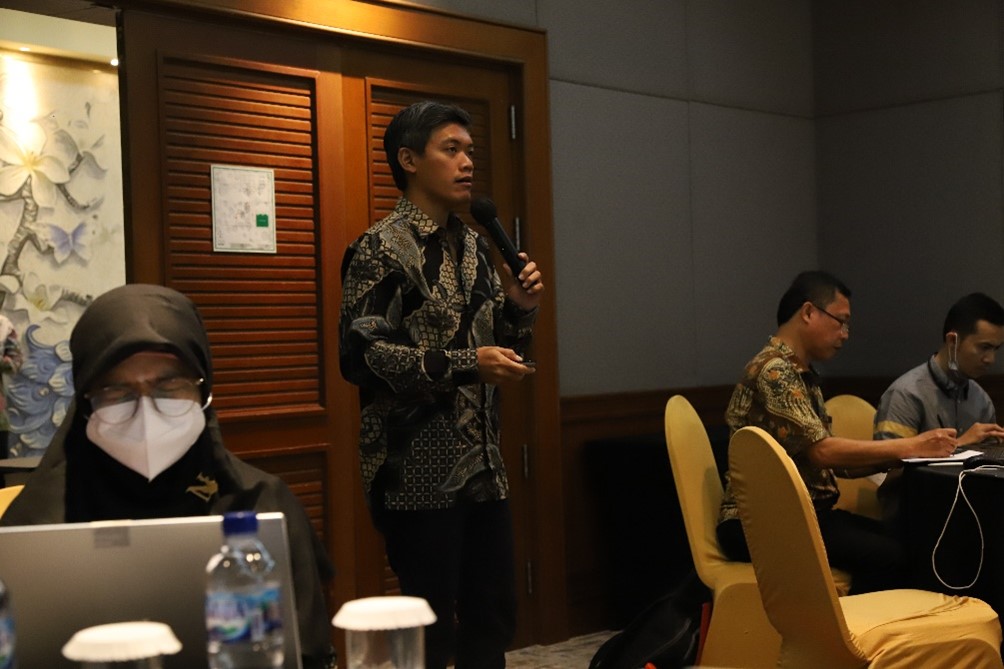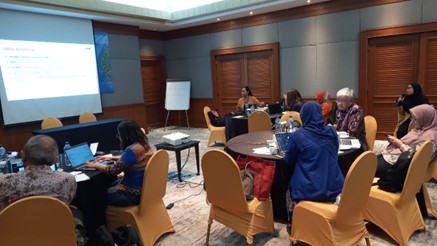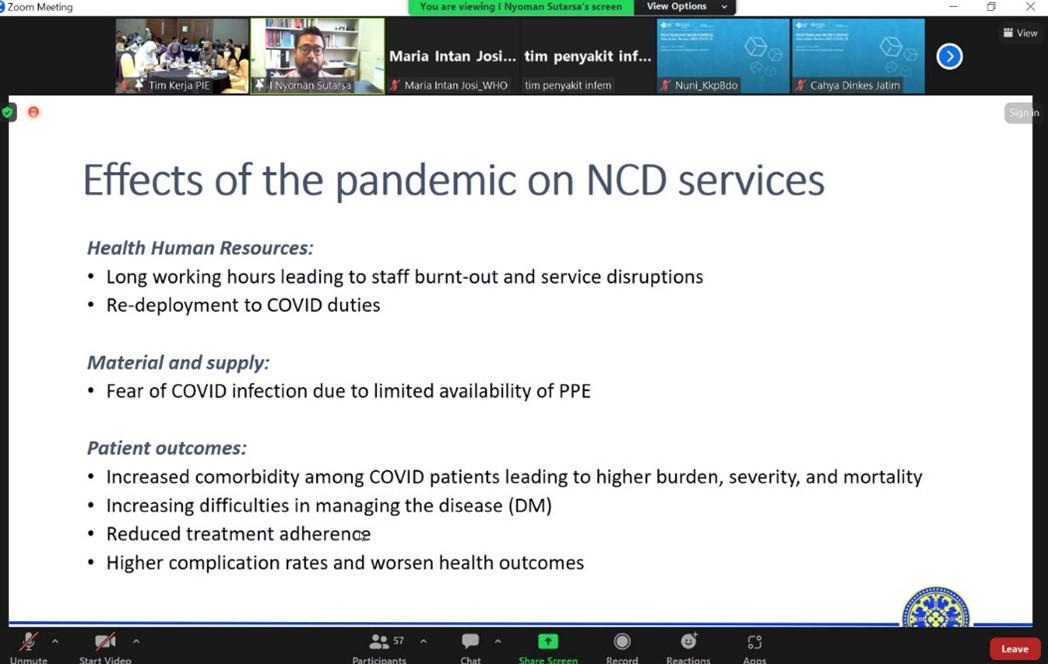Following WHO’s declaration of COVID-19 as a Public Health Emergency of International Concern (PHEIC) in January 2020, scientists and health professionals worldwide have engaged in rapid research and development (R&D) activities and contributed to building a new knowledge base at an unprecedent speed and volume. In February 2020, WHO convened the Global Research and Innovation Forum to coordinate and accelerate global research for COVID-19, leading to the development of the Coordinated Global Research Roadmap. The principle guiding this roadmap is the understanding that the best available research evidence should be at the centre of the COVID-19 response and underscores the need to strengthen Indonesia’s health research system.

Rapid review dissemination from UGM CHPM-Cochrane on Incident Command System (under Pillar I: Country‑level coordination, planning, and monitoring). Credits: WHO/Fieni Aprilia
The COVID-19 pandemic ignited a wide range of responses by the ministries, universities, non-governmental organizations (NGOs), UN agencies, companies, development partners, and civil society in Indonesia. These different actors generated a wealth of data and contributed to a significant surge in research publications by Indonesian researchers related to COVID-19. However, only a limited number has been published internationally and indexed in international bibliographic databases. To ensure global access to Indonesian national research on COVID-19, WHO incorporated these publications into the WHO COVID-19 Research Database, sourcing from national databases such as Garuda (Garba Rujukan Digital) and SINTA (Science and Technology Index). To improve research uptake, increase access to research articles and more effectively communicate findings to policymakers, WHO and MoH along with other stakeholders joined together to cultivate an ecosystem that facilitates the utilization of evidence in the country. One of the initiatives involved collaboration with experts from research institutions mandated to support COVID-19 response and preparedness at national and subnational level.
In 2022, amid the ongoing pandemic, WHO Indonesia engaged over 20 experts from four institutions in capacity-building activities. This initiative involved establishing a network of experts, centred around synthesizing research evidence using rapid review methodologies and packaging the findings for effective use by policymakers.

Dr Bayu Dhite from UGM CHPM - Cochrane presenting rapid review findings on Incident Command System. Credits: WHO/Fieni Aprilia

Aufia Espressivo from CISDI presented rapid review findings on community-based surveillance.
Each institution identified real-life public health and health system policy topics related to COVID-19 response and preparedness in terms of the structure, organization and functions of the health system; actions and practices of stakeholders within the health system; or conditions and factors related to implementing certain changes. Key insights from their research include:
Implementation of the Incident Command System (ICS): Highlighted the importance of ICS in managing health emergencies such as COVID-19, emphasizing rapid system adaptation, ICS terminology socialization, and stakeholder awareness.
Strengthening non-communicable disease (NCD) health services: Strategic use of technology in NCD service delivery would enhance primary healthcare, requiring increased investment in health information and digital skills.
Digital health surveillance: Identified the need for a technology innovation hub and matchmaking forum for developers and users.
Community-based surveillance (CBS): Leveraging Indonesia’s CBS system for tackling airborne diseases, stressing cadre capacity building, institutionalization, coordination, and integration.

Dr. dr. I Nyoman Sutarsa from School of Public Health Udayana presenting the effect of pandemic on NCD services through online platform. Credits: WHO
The findings from the rapid reviews were deliberated during the 8th COVID-19 response intra action review (IAR) monitoring meeting held from 21-24 June 2023 in Jakarta. These findings enriched and bolstered the discussions during the IAR meeting, leveraging the lessons learned captured in the research evidence along the various COVID-19 response and preparedness pillars. The network of experts will continue to provide support so that research evidence can be used more efficiently and effectively for enhanced evidence-based policymaking. In addition, WHO will support Indonesia with development and establishment of a research council and accelerate the establishment of research databases to improve use of evidence. These next steps will enhance Indonesia’s COVID-19 response and will lay the groundwork for a more resilient health system in Indonesia.
This activity is supported by the Australian Government and the European Union.
Written by Maria Intan Josi, National Health Research System Strengthening, WHO Indonesia
